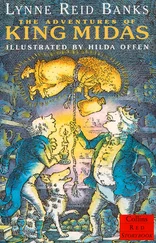Glyn Iliffe - King of Ithaca (Adventures of Odysseus)
Здесь есть возможность читать онлайн «Glyn Iliffe - King of Ithaca (Adventures of Odysseus)» весь текст электронной книги совершенно бесплатно (целиком полную версию без сокращений). В некоторых случаях можно слушать аудио, скачать через торрент в формате fb2 и присутствует краткое содержание. Год выпуска: 2009, ISBN: 2009, Издательство: Macmillan Publishers UK, Жанр: Старинная литература, на английском языке. Описание произведения, (предисловие) а так же отзывы посетителей доступны на портале библиотеки ЛибКат.
- Название:King of Ithaca (Adventures of Odysseus)
- Автор:
- Издательство:Macmillan Publishers UK
- Жанр:
- Год:2009
- ISBN:9780230744486
- Рейтинг книги:3 / 5. Голосов: 1
-
Избранное:Добавить в избранное
- Отзывы:
-
Ваша оценка:
- 60
- 1
- 2
- 3
- 4
- 5
King of Ithaca (Adventures of Odysseus): краткое содержание, описание и аннотация
Предлагаем к чтению аннотацию, описание, краткое содержание или предисловие (зависит от того, что написал сам автор книги «King of Ithaca (Adventures of Odysseus)»). Если вы не нашли необходимую информацию о книге — напишите в комментариях, мы постараемся отыскать её.
King of Ithaca (Adventures of Odysseus) — читать онлайн бесплатно полную книгу (весь текст) целиком
Ниже представлен текст книги, разбитый по страницам. Система сохранения места последней прочитанной страницы, позволяет с удобством читать онлайн бесплатно книгу «King of Ithaca (Adventures of Odysseus)», без необходимости каждый раз заново искать на чём Вы остановились. Поставьте закладку, и сможете в любой момент перейти на страницу, на которой закончили чтение.
Интервал:
Закладка:
Odysseus took the bow from Iphitus’s hand. It was clean and smooth and sat in his palm as if it had been purposely crafted for him alone. Then they all looked at Iphitus and knew he would never now feast with them in the great hall in Ithaca, for when he found Heracles he was certain to die.
book
THREE
Chapter Fifteen
SPARTA
They stood in the foothills of the Taygetus Mountains and looked across the wide valley to the city of Sparta. It lay wedged between the river Eurotas and a lesser tributary, strung like a gold medallion on a silver necklace. It was a wealthy place, home to a numerous, warlike and proud people who had made themselves rich by conquest and trade. They were further blessed with rolling, fertile plains for the growing of crops and the breeding of horses, for which the Spartans were famous throughout Greece. The Eurotas flowed freely down to the coast, enabling their merchants to reach the sea with ease. And by the same route goods came in to Sparta from the rest of the world, providing Cyprian copper for her armourers, Nubian gold and Attican silver for her craftsmen, and a wealth of ivories, textiles, pottery and other luxuries.
The city was larger than anything Eperitus had ever seen before or had dared to imagine. There were the usual hovels of the poor on the outskirts, but these eventually gave way to the magnificent homes of the richer classes, whose lime-plastered walls staggered upwards like giant steps towards the city’s acropolis, the hill upon which sat the royal palace.
The morning had been a dull one – cold and threatened by rain – but as he caught his first glimpse of Sparta, set against a backdrop of steep mountains, the clouds parted and broad fingers of sunlight reached down to lift the city from the greyness. It glowed golden-white under the scintillating rays as wall followed wall, gate led to gate, and roof overlapped roof, creating an awesome edifice that dominated the whole valley.
The group of dusty warriors looked on in silence. In comparison, Ithaca was nothing more than a poor, unsophisticated island with a few ramshackle towns and villages. There were no glorious buildings or awe-inspiring palaces to impress visitors; no battlements or soaring watchtowers to deter invaders; no paved streets filled with wealthy merchants or bronze-clad soldiers. All that their homeland could offer were dusty cart tracks that led to simple dwellings surrounded by pigs, chickens and dogs.
Eperitus glanced across at Odysseus. After Messene, the men’s spirits had lifted; they knew that once they had passed the Taygetus Mountains and reached Sparta they would find food, drink and plenty of rest. In contrast, Odysseus had grown quiet and withdrawn. On the night before they entered the mountain passes that would take them to Sparta, he had invited Eperitus to join him as he went into the hills to hunt food. Whilst the prince had an arrow fitted to the great bow he was happy again, shooting rabbits at great distances and exulting at the magical accuracy of his new weapon. Often he would comment upon what a match there would have been between Apollo’s bow and the arrows of Heracles. But as they headed back to camp his despondency returned and the prince began to talk about Ithaca and his concerns for his countrymen under the yoke of Eupeithes and his Taphian army. He longed to return and fight, especially now he knew Helen’s husband had already been chosen, but Athena had told him to go on. Yet what would he find there? And what if he failed in his task and returned to Ithaca empty-handed, to lead the last of the palace guard to certain death against Eupeithes’s army?
‘I feel helpless, Eperitus,’ he said, kicking out at a pile of dead leaves and scattering them across the path. ‘I may be known for living by my wits, but I prefer to know where I’m going. I’d happily exchange places with you or any of the others. You’re soldiers and your job is to follow orders. If your captain says, “Slay that man,” then that’s what you do. But I have the fate of a whole people on my back. If I fail, Ithaca fails. And my captains are the gods – a more heartless and fickle bunch you couldn’t ask for. What matter if their earthly schemes don’t come off? They return to Olympus and forget their sorrows with ambrosia and nectar, whilst mortal corpses lie piled on the ground, their souls shepherded off to eternal misery in the halls of Hades. But what choice do we have but to obey their whims? I tell you in truth, I’d give anything to overturn my fate and dictate my own destiny.’
Talking about it put him in an even blacker mood, and when they returned to the camp he placed himself on guard duty and spoke to nobody for the rest of the evening. His silence continued throughout the next morning as they marched over the mountain passes to the Eurotas valley. But as Eperitus looked at his friend now, with the city of Sparta gleaming in the valley below, his stern expression had gone. He looked at the city as if he were sizing up an opponent. Here was the challenge that would require all of his wit and resources, and it was a test that he could not afford to fail. Suddenly his features were transformed by a smile.
‘Halitherses! See that the men are looking their best. We don’t want the Spartans mistaking us for a bunch of brigands, do we?’
Halitherses made himself busy inspecting their armour, making sure it was laced up tightly and sitting properly on their torsos. Then he tugged their shield straps and belts into place, checked that they still wore their little sprigs of chelonion – to remind them of their homes when they were tasting the delights of Sparta – and finally had them take out their whetstones from their pouches and sharpen the blades of their weapons so that they gleamed with a killing edge.
‘When you march through those gold-paved streets,’ he said, manhandling them into a double file, ‘I want you to walk with your chins held high and your eyes straight ahead. No looking at the pretty young Spartan girls, do you understand? Remember who you are, where you’re from and why we’re here.’
When they eventually reached the city, there were no pretty girls to be seen. In fact, other than a number of soldiers in various styles of armour and dress, they saw very few people at all. But the empty streets did not detract from the wonder of Sparta. Every wall was high and well built, each strong door ornately carved, and almost every house possessed a second floor. Empty windows stared down on them from every side as they marched up the steep and winding road towards the palace, and Eperitus marvelled to see such beauty and magnificence.
Eventually they reached the palace gateway. The doors were twice as high and twice as wide as their counterparts in Ithaca and were covered in beaten silver that gleamed dully in the watery afternoon light. As they arrived a soldier in full armour emerged from a large guard hut built against the wall to one side of the entrance. He looked strained and tired.
‘State your name and your business,’ he said, with a voice that sounded weary of dealing with foreign nobles.
‘I am Odysseus, son of Laertes, king of Ithaca. I’ve come to pay court to Helen of Sparta, by reputation the most beautiful woman in Greece.’
This last was added by way of a compliment to Sparta as a whole, but the guard captain remained unimpressed.
‘I’m sorry, my lord, but I have orders to permit entrance only to those who have been invited by the king. As I’ve never heard of Ithaca or any of its princes or kings, you’d better turn about and return the way you came.’
When Eperitus heard his words and thought of the hardships they had endured to arrive at these gates, only to be rejected like a pack of mere beggars, he felt the fighting rage come rushing into his veins. By the murmurs of his comrades he could tell they were angered too. One nod from Odysseus and they would happily have killed the guard and stormed the palace gates. But the prince was more patient than his men, and showed no sign of anger as he walked up to the Spartan.
Читать дальшеИнтервал:
Закладка:
Похожие книги на «King of Ithaca (Adventures of Odysseus)»
Представляем Вашему вниманию похожие книги на «King of Ithaca (Adventures of Odysseus)» списком для выбора. Мы отобрали схожую по названию и смыслу литературу в надежде предоставить читателям больше вариантов отыскать новые, интересные, ещё непрочитанные произведения.
Обсуждение, отзывы о книге «King of Ithaca (Adventures of Odysseus)» и просто собственные мнения читателей. Оставьте ваши комментарии, напишите, что Вы думаете о произведении, его смысле или главных героях. Укажите что конкретно понравилось, а что нет, и почему Вы так считаете.










